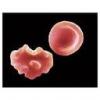
carolyn swickard
Reputation Activity
-
 carolyn swickard got a reaction from Malcolm Needs in Do you use microscope in transfusion services?
carolyn swickard got a reaction from Malcolm Needs in Do you use microscope in transfusion services?
I find checking tubes under the scope still quite useful and will just continue with it until I retire. DATs, Fetal Screens (are SUPPOSED to be read under the scope) and weak reacting tube tests (especially when Capture is showing something and tube reactions are SO much weaker) are very useful, I find. We do not read rare reagents under the scope as that can lead to mis-interpretation of the test results. Rouleaus vs. agglutination is usually only detectable under a scope. Not to mention (but I will anyway!) my eyes are not as sharp as they used to be and the concave mirror just doesn't always do enough for me. Just like to see the reaction as MERRYPATH does.
Sorry, Malcolm!
-
 carolyn swickard got a reaction from BankerGirl in newborn naming conventions
carolyn swickard got a reaction from BankerGirl in newborn naming conventions
Letters (A, B, C...) and/or numerics (1, 2, 3...) would take less space than the ONE, TWO, THREE you currently propose - just a thought. If the numbers are buried a little deeper (STEPHANIE1) they won't bother most computer systems.
-
 carolyn swickard got a reaction from tricore in transfusion reactions
carolyn swickard got a reaction from tricore in transfusion reactions
If you are Joint Commission accredited in your lab, this is no longer a problem. Joint has a standard QSA.05.18.01 that states specifically "The requirement that suspected transfusion related adverse events are reported immendiately to the lab, whether or not the the physician responsible for the patient deems it necessary to report the event."
This changed what we do to: if we hear about it - it gets worked up. (that's if my team member remembers the change!!!)
I have attached our old paperwork for the Transfusion Reaction Workup Request and the Transfusion Reaction Workup. Feel free to use what might help you. We are still struggling to get this in Meditech - tried to make it too fancy and have finally decided to back down to simple T-Tests, but now don't have the time to build them with my IT Coor. (Oh well!)
Suspected Transfusion Reaction Workup 742-002.pdf
Suspected Transfusion Reaction Workup Request 742-001.pdf
-
 carolyn swickard reacted to AMcCord in Urgent Requirement for RBCs
carolyn swickard reacted to AMcCord in Urgent Requirement for RBCs
Here's a process map I have used recently for training purposes. It is going to become a job aid in my new SOP for emergency release.
Process Map - Emergency Release.docx
-
 carolyn swickard reacted to John C. Staley in Validation of expired panel cells
carolyn swickard reacted to John C. Staley in Validation of expired panel cells
Only 57 more shifts and I will no longer have to worry about this nonsense. For those of you who do, I feel truly sorry. The insanity seems to keep getting worse with each passing year and new set of bureaucrats. Maybe I could be a consultant for some of these agencies. They certainly need some common sense guidance.
-
 carolyn swickard got a reaction from John C. Staley in Validation of expired panel cells
carolyn swickard got a reaction from John C. Staley in Validation of expired panel cells
This is getting a little ridiculous. With good controls showing the antigen is still reactive (either the pt or antigen reagents), expired panels should be OK to use for additional ruleouts only, as we have done for decades. You don't use them for the initial work, but ruleouts surely are OK?
Haven't we recently had several discussions on how to do controls on these older panels just for this use - and now we can't use them at all??? I am only able to keep one panel on site at a time - that is not always going to allow for all ruleouts. We keep our panels for up to 3 months only and run a positive control on the panel to show the antigen being tested for is still detectable.
CAP did have a specific standard that allowed an exception for the use of RARE antigen typing reagents only (the really expensive ones) that passed controls on day of use. TJC does not have that same exemption and I have wondered what they would do with Blood Bank reagents. Doesn't sound encouraging. We will be inspected by TJC this year (our 2nd time), so I guess I will find out.
None of the rest of our routine reagents are expired and we do not use expired RBC reagents either for routine testing.
-
 carolyn swickard got a reaction from kirkaw in Validation of expired panel cells
carolyn swickard got a reaction from kirkaw in Validation of expired panel cells
This is getting a little ridiculous. With good controls showing the antigen is still reactive (either the pt or antigen reagents), expired panels should be OK to use for additional ruleouts only, as we have done for decades. You don't use them for the initial work, but ruleouts surely are OK?
Haven't we recently had several discussions on how to do controls on these older panels just for this use - and now we can't use them at all??? I am only able to keep one panel on site at a time - that is not always going to allow for all ruleouts. We keep our panels for up to 3 months only and run a positive control on the panel to show the antigen being tested for is still detectable.
CAP did have a specific standard that allowed an exception for the use of RARE antigen typing reagents only (the really expensive ones) that passed controls on day of use. TJC does not have that same exemption and I have wondered what they would do with Blood Bank reagents. Doesn't sound encouraging. We will be inspected by TJC this year (our 2nd time), so I guess I will find out.
None of the rest of our routine reagents are expired and we do not use expired RBC reagents either for routine testing.
-
 carolyn swickard reacted to pstruik in HDN procedures
carolyn swickard reacted to pstruik in HDN procedures
To completely mangle an already strained analogy and to offer support to Malcolm - two heinous crimes - zebras and unicorns are always likely to be detected less frequently by people who don't look for them.
Our routine testing is always going to be less exhaustive than that done by specialist laboratories on referred samples in cases of special interest which is why they find wonderfully interesting things and get to, say, jet around the world telling people about them ...
Jealous ? Moi ?
(No. The inestimable Mr Needs very much deserves his reputation)
-
 carolyn swickard got a reaction from Malcolm Needs in Validation of expired panel cells
carolyn swickard got a reaction from Malcolm Needs in Validation of expired panel cells
This is getting a little ridiculous. With good controls showing the antigen is still reactive (either the pt or antigen reagents), expired panels should be OK to use for additional ruleouts only, as we have done for decades. You don't use them for the initial work, but ruleouts surely are OK?
Haven't we recently had several discussions on how to do controls on these older panels just for this use - and now we can't use them at all??? I am only able to keep one panel on site at a time - that is not always going to allow for all ruleouts. We keep our panels for up to 3 months only and run a positive control on the panel to show the antigen being tested for is still detectable.
CAP did have a specific standard that allowed an exception for the use of RARE antigen typing reagents only (the really expensive ones) that passed controls on day of use. TJC does not have that same exemption and I have wondered what they would do with Blood Bank reagents. Doesn't sound encouraging. We will be inspected by TJC this year (our 2nd time), so I guess I will find out.
None of the rest of our routine reagents are expired and we do not use expired RBC reagents either for routine testing.
-
 carolyn swickard got a reaction from Susan Betler in Issuing products to nursing staff if they have food or drink
carolyn swickard got a reaction from Susan Betler in Issuing products to nursing staff if they have food or drink
Yes - it seems like the phones are even worse than the food problem now. But how are you going to know if they stop in the cafeteria on their way back upstairs unless you just happen to run into them there? Hummmm - maybe that explains that slow start time on some of those units when we get the unit review back.....!!!
-
 carolyn swickard reacted to John C. Staley in LAB HUMOR
carolyn swickard reacted to John C. Staley in LAB HUMOR
I have absolutely never, ever wanted a doctors job and I desperately wish most of them didn't have it either!!!
-
 carolyn swickard reacted to Liz0316 in What are your facilities procedures for indicating needing irradiated blood products?
carolyn swickard reacted to Liz0316 in What are your facilities procedures for indicating needing irradiated blood products?
The following is not pretty, but I finally got the indications to copy and paste. This is what we use for indications for irradiated products, which may be more than normal - however, we do have our own irradiator.
Questions - let me know.
Liz
7. IRRADIATED CELLULAR BLOOD COMPONENTS:
A. Accepted indications:
1. Immunocompromised marrow or organ transplant recipients.
2. Patients with hematologic disorders who will be undergoing allogeneic marrow transplantation imminently.
3. Intrauterine transfusions.
4. Neonatal exchange transfusions or use of extracorporeal membrane oxygenation (ECMO).
5. Neonates or pre-term infants.
6. Lymphoproliferative malignancies treated with Fludarabine.
7. Patients with Hodgkin’s disease.
8. Patients with congenital cell-mediated immunodeficiencies.
9. Recipients of directed donations from biologic relatives.
10. Recipients of donations from HLA-matched donors.
11. Recipients who are heterozygous at an HLA locus for which the donor is homozygous and shares an allele.
B. Possible indications:
1. Individuals getting immunosuppressive therapy, especially when susceptible to opportunistic infections.
2. Cancer patients who are immunosuppressed because of chemotherapy or radiation therapy.
3. Patients with AIDS who have opportunistic infections.
-
 carolyn swickard got a reaction from Susan Betler in TRM.31450 Comparability of Instrument/Method - new checklist 7/11/11
carolyn swickard got a reaction from Susan Betler in TRM.31450 Comparability of Instrument/Method - new checklist 7/11/11
I use my 3 times yearly Automated Transfusion Survey specimens (5 specimens X 3 times/year), record the results from the Echo on a Yearly Method Correlation form I cobbled together and then test the same specimens on both tubes (all ABORhs) and 2 ABSCs and on manual Capture (3 ABSCs) - our two bench methods - and record on same form. Seems to work OK and is easy to document. :cool:
-
 carolyn swickard got a reaction from Dan87 in Competency Assessment in the Transfusion Service.
carolyn swickard got a reaction from Dan87 in Competency Assessment in the Transfusion Service.
Here's mine too - if it will help anyone. Very difficult to get everyone through and despite telling them it is THEIR responsibility - you wind up doing the lion's share of it in order to get it done.
Blood Bank Competency 2014.xls
Blood Bank Skills 2014.xls
-
 carolyn swickard reacted to Malcolm Needs in A curious case of anti-e
carolyn swickard reacted to Malcolm Needs in A curious case of anti-e
Hi Emelie,
Things like this can be extremely confusing.
I am assuming that the anti-e is an autoantibody, or is the patient e negative?
If it is an autoantibody, you are correct in thinking that it could have been introduced parenterally in the IVIgG, because they seem to put all sorts of things in that (including high titre ABO antibodies!), although that would not necessarily explain the wide thermal amplitude of the antibody. One thing I would say though, is that not all cold antibodies are IgM. I can give you 2 examples straight off that are cold reacting IgG antibodies. The first is the anti-P (the famous biphasic anti-P) that causes PCH. The second is an ABO antibody that causes ABO HDN. If you put a sample of cord blood in the fridge over night, and examine it the next day, you will see agglutination. The antibody causing this MUST be maternal (otherwise it would be an autoantibody - which the baby could not have made at that stage of life), and, as it has gone through the placenta, MUST be IgG, rather than IgM.
If the antibody did not originate in the IVIgG, and it is an autoantibody, I should warn you that the specificities seen in such cases are often "mimicking" antibodies. In other words, something that looks like a straight forward anti-e, may not be. Often, if you carry on long enough with repeated adsorptions, you can adsorb out the antibody to exhaustion, using antigen negative red cells (in this case, e negative red cells).
Lastly, if the patient has, as you say, a life long immunodeficiency, it may be that the antibody molecules that he does make are "mutations" when compared with other peoples' antibody molecules. A similar situation can be found in human monoclonal IgM anti-D molecules, which have a V4-34 moiety that is essential to the antibody "working", but is identical to a structure on both anti-I and anti-I. This is why you should never use a monoclonal anti-D reagent straight from the fridge, as there is a danger that it will react like a true anti-I or anti-I, leading to false positive results.
I'm not certain that I have been able to help with this answer (I've probably served only to muddy the waters even further), but I hope I have explained it a little, and may stimulate others to give a more concise, and possibly more accurate answer.
-
 carolyn swickard reacted to THintz in centrifuge calibration
carolyn swickard reacted to THintz in centrifuge calibration
Here is the procedure and form we use for the calibration of all of our centrifuges (Hettich EBA 21 and Sorvall Cellwasher 2). This works well for us, hope you find it useful.
Terri
TS 002404 Calibration of Serologic Centrifuges.doc
TS 009002 Serologic Centrifuge Calibration Worksheet.doc
-
 carolyn swickard reacted to tricore in Malcolm is coming to town.......
carolyn swickard reacted to tricore in Malcolm is coming to town.......
I left NJ in 1967. Grew up there. I live" way out west" now. Sorry, I don't know Astrd Farmer. Actually NJ is small compared to NM. NM 121,599 sq mi, NJ 7,790 sq mi, of course, NJ has many more people. NJ 8,899,339 NM 2,085,287
-
 carolyn swickard got a reaction from skyanto in Neonatal Exchange Transfusion
carolyn swickard got a reaction from skyanto in Neonatal Exchange Transfusion
We had to recently update and revamp our too - same reason. Hope this helps. Our procedure is specific for Meditech, but most of it is usable.
61-Newborn Exchange Transfusion - 2.doc
67-Transfusion of the Neonatal Recipient (under 4 months) (2).doc
Exchange Transfusions RBC Unit Worksheet.doc
-
 carolyn swickard got a reaction from L106 in A Christmas Story
carolyn swickard got a reaction from L106 in A Christmas Story
Mine is a small, plastic Nativity that has been in my family as long as I can remember. I have fixed it over time and even "re-glittered" it once and the original box is still hanging in there too. It goes up somewhere each year, helping me still feel close to my parents.
Merry Christmas everyone and may you all have a healthy and prosperous New Year.
-
 carolyn swickard got a reaction from Malcolm Needs in A Christmas Story
carolyn swickard got a reaction from Malcolm Needs in A Christmas Story
Mine is a small, plastic Nativity that has been in my family as long as I can remember. I have fixed it over time and even "re-glittered" it once and the original box is still hanging in there too. It goes up somewhere each year, helping me still feel close to my parents.
Merry Christmas everyone and may you all have a healthy and prosperous New Year.
-
 carolyn swickard reacted to John C. Staley in sending patient samples to a reference lab
carolyn swickard reacted to John C. Staley in sending patient samples to a reference lab
I wish I had a dime for everytime I wanted to transfuse a patient just so I could get their antibody levels up to a point I could easily identify them!!! Never did but sure thought about it.
-
 carolyn swickard got a reaction from tbostock in Neonatal Exchange Transfusion
carolyn swickard got a reaction from tbostock in Neonatal Exchange Transfusion
We had to recently update and revamp our too - same reason. Hope this helps. Our procedure is specific for Meditech, but most of it is usable.
61-Newborn Exchange Transfusion - 2.doc
67-Transfusion of the Neonatal Recipient (under 4 months) (2).doc
Exchange Transfusions RBC Unit Worksheet.doc
-
 carolyn swickard got a reaction from AMcCord in Neonatal Exchange Transfusion
carolyn swickard got a reaction from AMcCord in Neonatal Exchange Transfusion
We had to recently update and revamp our too - same reason. Hope this helps. Our procedure is specific for Meditech, but most of it is usable.
61-Newborn Exchange Transfusion - 2.doc
67-Transfusion of the Neonatal Recipient (under 4 months) (2).doc
Exchange Transfusions RBC Unit Worksheet.doc
-
 carolyn swickard got a reaction from aafrin in Neonatal Exchange Transfusion
carolyn swickard got a reaction from aafrin in Neonatal Exchange Transfusion
We had to recently update and revamp our too - same reason. Hope this helps. Our procedure is specific for Meditech, but most of it is usable.
61-Newborn Exchange Transfusion - 2.doc
67-Transfusion of the Neonatal Recipient (under 4 months) (2).doc
Exchange Transfusions RBC Unit Worksheet.doc
-
 carolyn swickard got a reaction from Likewine99 in Neonatal Exchange Transfusion
carolyn swickard got a reaction from Likewine99 in Neonatal Exchange Transfusion
We had to recently update and revamp our too - same reason. Hope this helps. Our procedure is specific for Meditech, but most of it is usable.
61-Newborn Exchange Transfusion - 2.doc
67-Transfusion of the Neonatal Recipient (under 4 months) (2).doc
Exchange Transfusions RBC Unit Worksheet.doc







